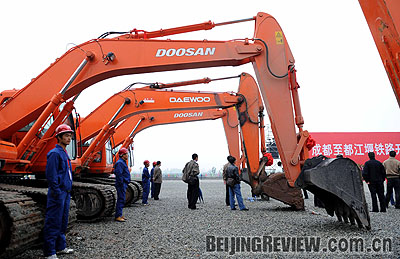|

REBUILDING SICHUAN: Construction started on the railway between Chengdu, capital of Sichuan Province, and Dujiangyan on November 4. The 13.3-billion-yuan ($1.95 billion) rail line, slated to be operational around 2010, is part of the government's project to revive quake-affected areas
Jet Deal
China signed its biggest aircraft export deal ever in terms of numbers of jets and contract value at the Seventh China International Aviation and Aerospace Exhibition, held on November 4-9 in Zhuhai, Guangdong Province.
According to the 5-billion-yuan ($733 million) deal, signed on November 4, the Commercial Aircraft Corp. of China Ltd. (COMAC) will sell 25 ARJ21-700 regional jets to GE Commercial Aviation Services, an aircraft-leasing arm of the General Electric Co.
COMAC Chairman Zhang Qingwei told Xinhua News Agency that this was the first time that the Chinese-developed and manufactured regional jets have entered Western airline markets.
"This is an important opportunity for us to tap into the international markets, and meanwhile we are also exploring China's own way of building jumbo planes," he said.
Takeover Afoot
The newly merged China Aviation Industry Corp. (AVIC) plans to acquire a foreign general aviation aircraft manufacturer to strengthen its development capabilities.
An acquisition agreement is expected to be signed at the end of this year, Tan Weidong, President of AVIC General Aviation Co. Ltd., was quoted as saying by China Daily on November 4. Tan did not reveal the name of the foreign company.
AVIC is also planning to list its general aviation businesses in the near future, Tan added.
AVIC was launched at the end of last month with the merging of China's two leading State-owned aviation manufacturers, AVIC I and AVIC II, amid government endeavors to consolidate and strengthen the country's aviation manufacturing capabilities.
Futures Commitment
The Dalian Commodity Exchange (DCE), China's largest futures exchange by volume, signed a memorandum of understanding with the U.S.-based NYSE Euronext on November 4 to jointly develop futures and options markets.
The agreement, designed to extend the global reaches of both exchanges, would provide more opportunities for information sharing, employee exchanges and collaboration on IT solutions and product designs.
"The global financial turmoil has triggered widespread suspicion of the derivatives market," Liu Xingqiang, DCE President told Xinhua News Agency. "As market organizers, we are obliged to set up an information sharing system to promote the healthy development of the market."
Nestle Makes Headway
Nestle SA, a Swiss food and beverage giant, opened a research and development (R&D) center at the Zhongguancun Environmental Protection Park in Beijing-its second R&D facility in China. The company set up the first one in Shanghai in 2001.
With approximately 70 million yuan ($10.2 million) of investment, the Beijing R&D center will be a new branch of the company's global R&D network, which includes 24 facilities.
"To better meet the growing needs for safe and high-quality food products in the Chinese market, the center will help serve Nestle's 20 factories in the country, providing more technical products for local consumers," said Paul Bulcke, CEO of Nestle Worldwide.
Spending Freeze
The Ministry of Finance (MOF) issued a circular on November 4 noting that government agency spending in 2009 will be capped at this year's level, ending the 5-percent average annual increase during the past five years. Government agency spending mainly covers staff salaries and official business.
Wang Chaocai, Deputy Director of MOF's Research Institute for Fiscal Science told China Daily that the spending freeze would be achieved by reducing the number of conferences, reception activities, business trips as well as cutting transportation costs.
The circular also required spending budgets to be more transparent with further inspection and supervision both from within the agencies themselves and by the public.
| 